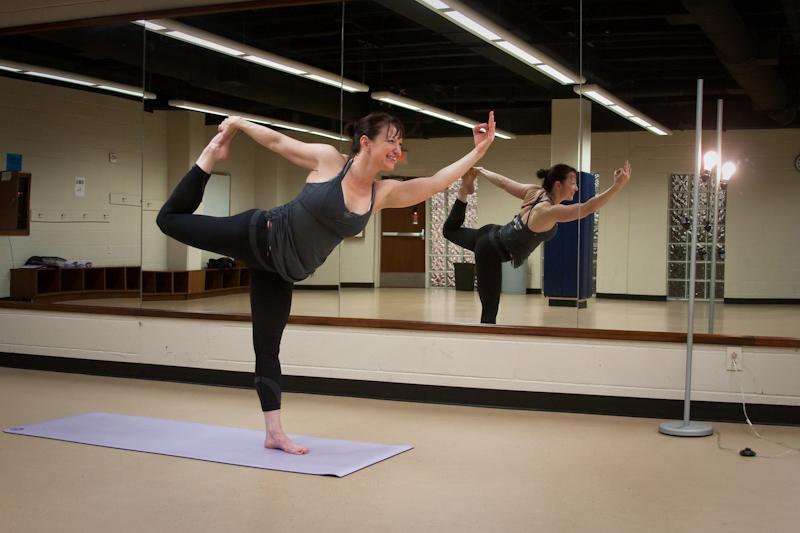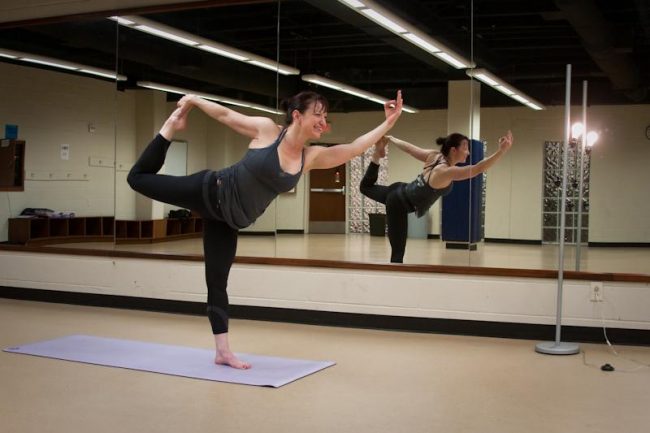
The Dedman Center offers Group X yoga every day of the week for $4 a class or $70 for an unlimitted passes. (Spencer J Eggers/The Daily Campus)
Yoga has been practiced for thousands of years so it can hardly be called a new exercise trend.
However, over the past few years it seems as though this form of exercise has become more popular than ever.
Not only has its popularity grown, there are a vast amount of different practices, which might seem a bit overwhelming if you have never tried it before.
How do you know what type of yoga is right for you?
Well, the only real way is to try out several classes and figure out which one you feel fits you best.
Yoga is practiced for all kinds of reasons.
“I love doing yoga because it is a great complement to my cardio workouts,” SMU student Elizabeth Ansbro said. “It has increased my flexibility and really helps with my stress levels.”
From weight loss, to reducing stress and increasing self-awareness there is bound to be a type that you will fall in love with.
If you like to finish your workout drenched in sweat, Bikram yoga may be just what you are looking for. Practiced in a 95 to 105 degree temperature room with 40 percent humidity, it increases detoxification and flexibility.
This cardiovascular yoga will get your heart pumping through a series of 26 basic postures.
It is important to make sure you are well hydrated before you begin class.
Hatha is a basic, slow-paced form of yoga that serves as the foundation for all types of yoga practices.
Take a Hatha class to unwind and gently de-stress from your busy day in a calm and relaxing setting.
As a beginner, this is a great way to get used to practicing yoga and building endurance strength.
For all of you who like to do more intense workouts and are afraid you will get bored in a yoga class, Ashtanga, otherwise known as power yoga, will surprise you.
As a more physically demanding and fast-paced type of yoga, the movements are quick and flow together. It incorporates muscle toning and cardio all in one.
Vinyasa yoga is also filled with fast movement and is based on a series of poses called sun salutations.
This yoga has a lot of diversity and most classes are completely different depending on the instructor.
After a long week full of tests and no sleep, Restorative yoga will help you to reach a state of deep relaxation.
This yoga is easy and far from strenuous but it will help you to sleep better and catch up on the much needed rest you are lacking.
Restorative yoga is a great opportunity to deeply stretch and try to soothe your muscles as they recover from an injury.
There are many other types of yoga practices in addition to the ones mentioned above.
Regardless of what type of yoga you prefer, there is no doubt that you will benefit both mentally and physically.
“Yoga is great for me because I love to run and it stretches out my muscles,” SMU student Tori DeClaris said. “But more importantly it makes me feel rejuvenated inside and out.”
If you practice regularly, you will notice improvement in your posture due to strengthened abdominal and lower back muscles.
Because yoga involves a lot of deep breathing, it may improve your lung capacity to strengthen your endurance in other aerobic activities.
Most yoga students agree that while they practice yoga for a number of reasons, the mental sense of peace they gain from it tops the list.
Yoga creates a sense of self-awareness about your body as you concentrate on each posture and will take your mind off of anything stressful you have going on in your life outside of your yoga practice.
Even if you only have 30 minutes each week, it is well worth your time to try incorporating yoga regularly into your workout routine.
Grab your mat and head out the door! You might just find that this is the best type of therapy you could ask for.










